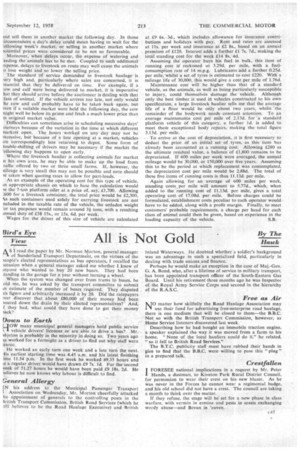All is N ot Gold
Page 81

If you've noticed an error in this article please click here to report it so we can fix it.
Bird's Eye View
By The Hawk A s 1 read the paper by Mr. Norman Morton, general manager !--1 of Sunderland Transport Department, on the virtues of the aeople's elected representatives as bus operators, I recalled the )ccasion when a general manager asked me whether I knew of inyone who wanted to buy 20 new buses. They had been -tangling in the garage for a year without turning a wheel. When the system was changed over from trams to bused. he old me, he was asked by the transport committee to submit in estimate of the number of buses' required. They disputed us figure and arbitrarily increased it by 20. Did the ratepayers :ver discover that about £80,000 of their money hao been Joured down the drain by their elected representatives?' And, f they had, what could they have done to get their money )ack?
Down to Earth
.TOW many municipal general managers hold public service vehicle drivers' licences or are able to drive a bus? Mr.Vlorton is probably in the minority in doing so. Two years ago se worked for a fortnight as a driver to find out why staff were Carce. He worked an early turn one week and a late turn the next. -us earliest starting time was 4.45 a.m, and his latest finishing ime 11.54 p.m. In the first week he worked 49.35 hours and s dregular driver would have drawn £9 7s. ld. For the second veek of 51.27 hours he would have been paid £9 18s. 2d. He ielieves he now knows why labour is difficult to find.
General Allergy
IN his address to the Municipal Passenger Transport
Association on Wednesday, Mr. Morton cheerfully attacked he appointment of generals to the controlling posts in the Iritish Transport Commission, British Road Services (which he till believes to be the -Road Haulage Executive) and British
Inland Waterways. He doubted whether a soldier's background was an advantage in such a specialized field, particularly in dealing with trade unions and finance.
Perhaps he would make an exception in the case of Maj.-Gen. G. A. Bond, who, after a lifetime of service in military transport, has been appointed transport officer of the South-Eastern Gas Board. Until his retirement three months ago he was Inspector of the Royal Army Service Corps and second in the hierarchy of the R.A.S.C.
Free as Air
NO matter how skilfully the Road Haulage Association may use their fund for advertising free-enterprise road haulage, there is one medium that will be closed to them—the B.B.C. Not so with the British Transport Commission, however, as Home Service listeners discovered last week. Describing how he had bought an immobile traction engine, a speaker explained the way it was moved from a farm to his home. "None of the local hauliers could do it," he related, "so it fell to British Road Services."
The B.T.C. publicity staff must have rubbed their hands in glee to find that the B.B.C. were willing to pass this "plug " in a prepared talk.
Crestfallen
IFORESEE national implications in a request by Mr. Peter Hands, a dustman, to Kiveton Park Rural District Council, for permission to wear their crest on his new blazer. As he was never in the Forces he cannot wear a regimental badge, and his old school did not have a crest. The council are taking a month to think over the matter.
If they refuse, the stage will be set for a new phase in class warfare, with vermin in ermine and pests in crests exchanging wordy abuse—and Bevan in 'eaven.
























































































































